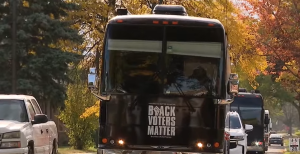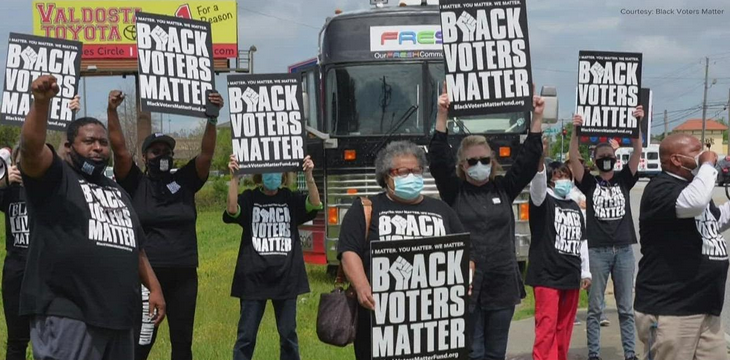By The Democracy & Power Innovation Fund
Photos: Black Voters Matter
Nearly 25 million Black and Latino people are missing or incorrectly listed in the voter databases sold by the political industry and used by campaigns to conduct voter outreach, according to a report from the Democracy & Power Innovation Fund. While 40 percent of Black and Latino people were effectively invisible in the vendor databases, only 18 percent of white people were missing or mislisted. The experts below are available for comment.

“Almost half of eligible Black and Latino voters won’t be seen or contacted by traditional campaigns. This is a five-alarm fire for our democracy,” said Miriam McKinney Gray, Founder and CEO of McKinney Gray Analytics, who analyzed the data based on U.S. Census records and a Stanford study. “The only way many people will learn about the election is through independent power-building organizations. Groups like Voces de La Frontera in Wisconsin and Detroit Action are using friends-and-family organizing to find missing voters and manually rebuilding lists of voters who have been wrongly purged from government voter rolls.”
“Twenty-five million Black and Latino people are invisible to the very campaigns that want their support. From our research on Black Values, we know who they are and the tools needed to reach them. It’s not too late to change course, but that takes breaking barriers that campaigns have blindly accepted for decades. We think democracy is worth it and so are the people who have been excluded,” said Katrina Gamble, PhD, of Sojourn Strategies. Dr. Gamble is conducting groundbreaking nationwide research into the differences in values and political behavior of the Black electorate and analyzing clusters or segments of Black voters for the first time.

One serious consequence of missing or incorrect data in purchased voter databases is that it distorts the algorithms that assign vote propensity scores to individual voters, according to the Democracy & Power Innovation Fund report. Ranada Robinson, Research Director for New Georgia Project (NGP) and its (c)(4) entity, New Georgia Project Action Fund, explained, “Traditional campaigns regularly and intentionally leave out people with low vote propensity scores, deeming them not worth the investment. To put it plainly, this approach is wrong. At New Georgia Project, we have found that these excluded and underestimated voters are often eager to engage and even turn out to vote when someone reaches out to them with regular touches. They aren’t ‘low propensity voters;’ they are ‘high opportunity voters’ because they present a clear opportunity to shift electoral strategies to become more just and effective and to create a more inclusive democracy. That’s exactly why my organization builds our voter universe to purposefully include voters with low vote propensity scores – because they have been left out for too long.”
“Campaigns that solely rely on the political industry’s voter databases will knowingly exclude millions of Black and Latino voters. Those campaigns will also get the race of voters wrong because the race modeling in the databases is subpar. They will not reach first-time or infrequent voters who are decisive in close contests and new voters who can register and vote on the same day in 22 states, including swing states like Michigan and Wisconsin. It’s independent groups like the Ohio Organizing Collaborative that are finding the missing voters that no one else is looking for,” said Prentiss J. Haney, Senior Advisor to the Ohio Organizing Collaborative (OOC). OOC runs one of the largest relational organizing programs in the country and was the first to use groundbreaking research into Black voters and the diversity of their values and political thought when Black voters were key to securing abortion rights and marijuana legalization in Ohio in 2023.

The Democracy & Power Innovation Fund is a partnership between state-based organizing groups, social science researchers, and aligned funders in support of learning and innovative programs that explore the connections between organizing, civic engagement, and building progressive power, with a focus on work in and led by communities of color.







